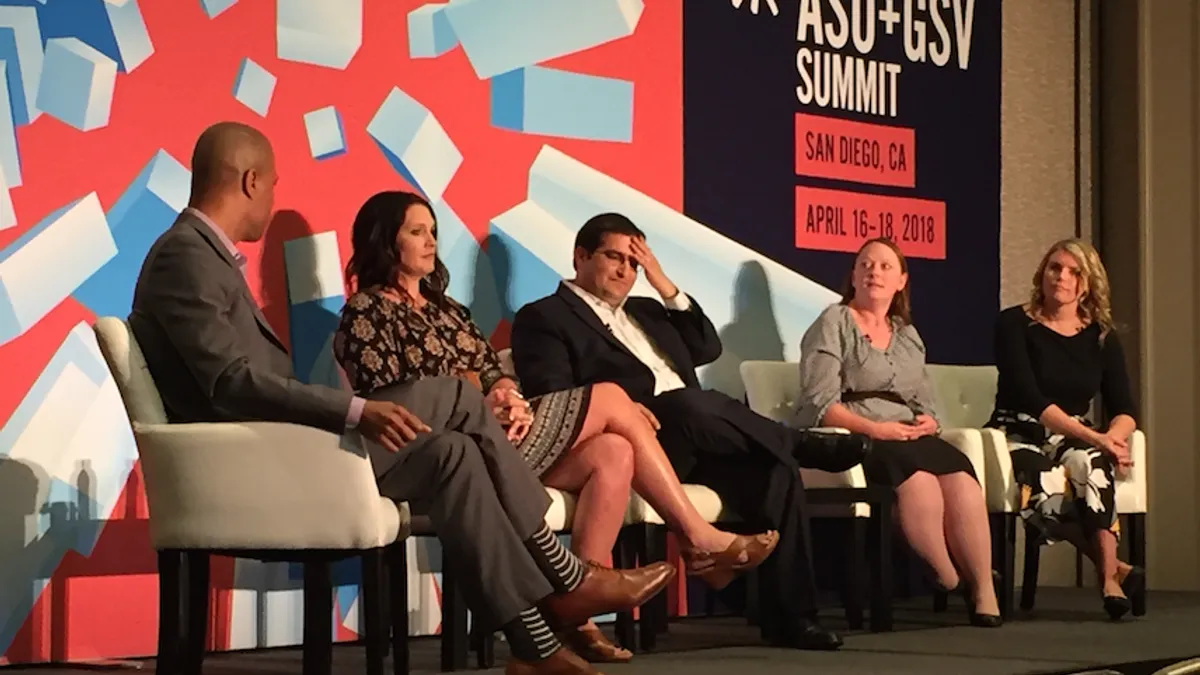Not changing gun laws following the 2012 mass shooting at Sandy Hook Elementary School in Newtown, CT, was a failure of former President Barack Obama’s administration, his Secretary of Education Arne Duncan said Wednesday at the ASU+GSV Summit in San Diego.
“Our generation absolutely failed. Our administration absolutely failed,” Duncan said in a chat with Jessie Woolley-Wilson, the chair, CEO and president of DreamBox Learning.
The superintendent of Chicago Public Schools for over seven years, Duncan said, “We lost a student every two weeks” to gun violence in their communities. Following the February shooting at Marjory Stoneman Douglas High School in Parkland, FL, Duncan helped organize a meeting between some Chicago high school students working to end gun violence in their own neighborhoods and the student survivors and activists from Parkland who were also involved in organizing the March for Our Lives.
“They are moving this country in ways I’ve never seen,” Duncan said.
The former secretary also discussed the work he is now doing to recruit incarcerated and formerly incarcerated 17- to 24-year-old young men into a job program intended to transition them from “an illegal economy to a legal economy.” He developed the project as part of his work as managing partner of Emerson Collective, a philanthropy created by Laurene Powell Jobs.
“I go to Cook County jail every month to recruit guys into the program,” he said. He now has seven cohorts of about 20 young men in the program.
While the business community has been more open to hiring the participants than Duncan anticipated, he still has to educate business leaders about how to work with a “different talent pool,” he said. “This can’t be charity.”
Professional learning: "An ongoing practice, not the Olympics"
Taking a design-thinking approach, paying teachers a stipend for earning microcredentials, and creating online teacher communities are a few of the ways both large and small districts are redesigning their professional learning systems.
“People dread bad professional learning,” said Frederick Brown, the deputy executive director of Learning Forward and the moderator of the morning session. He added that his organization has been working to spread the idea that teachers should be “actively engaged partners” in their learning. But at the same time, he said, there are growing demands from funders and policymakers to see evidence that professional learning improves outcomes for students.
In the Gwinnett County (GA) Public Schools, about 75 teachers from four schools are working with The Teachers Guild, part of IDEO, to test out and integrate teachers’ ideas into school and classroom practice.
“Students are going to be the problem solvers of tomorrow,” Babak Mostaghimi, the district’s executive director of Innovation and Program Learning, said during a morning session. That means, he added, that “teachers need to be able to design that learning experience.”
Some ideas, he added, don’t always work. And for a large district with a reputation for being well-managed and efficient, “talk about failing is kind of counter-cultural,” he said, but noted that he is trying to “push the district on how to integrate teachers’ ideas.”
In the small eastern Utah district of Juab Public Schools, over half of teachers have completed microcredentials through Digital Promise, which Krystle Bassett, the district’s innovation specialist, said gives them a network of other teachers who have either completed the same skill or are working toward it. “There is a reason it’s called a badge of pride,” said the former Girl Scout. Paying a stipend when teachers earn the badge has been written into the district’s policies, and teachers can follow a teacher leader pathway through the program.
But professional learning and collaboration in small or rural districts can be challenging when you have a “department of one,” said Rachel Langenhorst, a technology integrationist with the Rock Valley Community School District, near Sioux City, IA. She said the district really had to customize professional learning for individual teachers and is working with edWeb to give teachers access to an online community of peers. Working with community partners, the district also created Rockland University, an "in-house conference" in which district personnel and experts from the local hospital, for example, lead sessions on topics related to the population of students in the district.
In Chicago, Jessica Kertz is an administrator at Talcott Fine Arts and Museum Academy, which is working with LEAP Innovations to involve teachers in piloting new digital resources and sharing the learning with colleagues. “As a teacher I would not have learned about all the strategies that my teachers have,” she said.
The participants are more open about trying those strategies and often invite her to the classroom to see if a lesson will go well, she said, emphasizing that teaching is “an ongoing practice.”
“It’s not the Olympics,” she said. “It’s not one event.”













